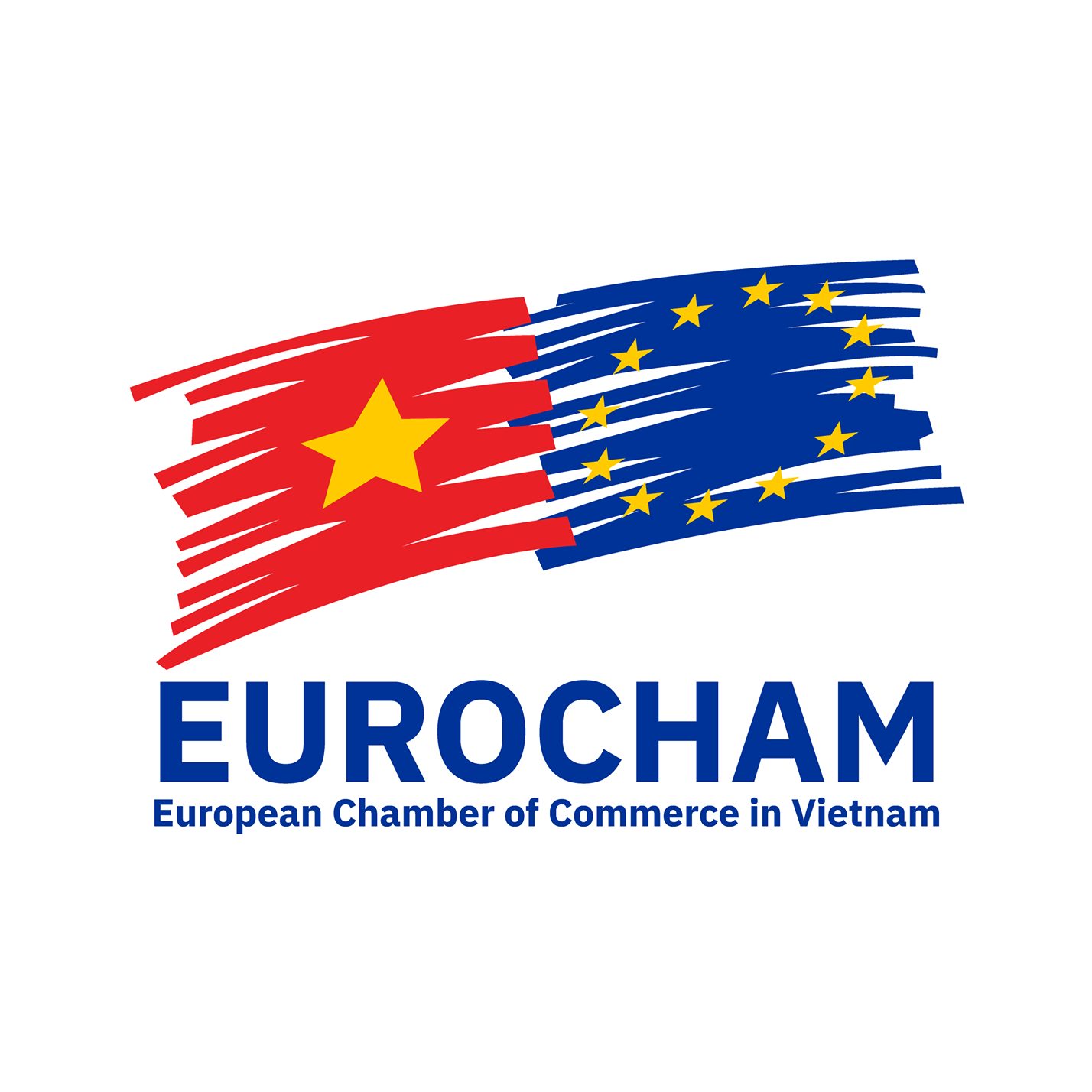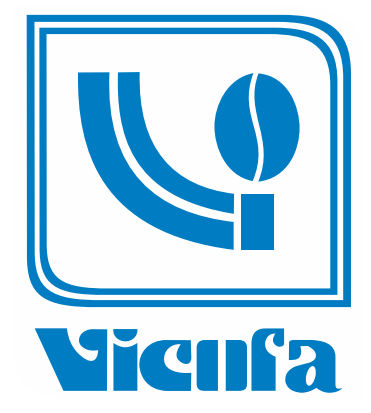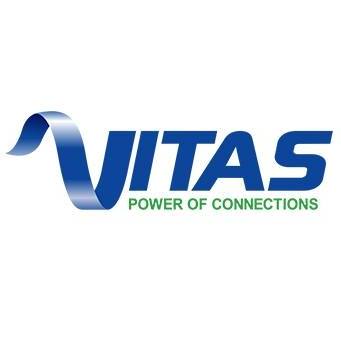_R6tE9fs-w.jpg)
As a trusted logistics partner specialized in Vietnam and Indochina, VICO Logistics aims to keep our clients informed of the latest regulatory changes affecting international trade. Most Vietnamese textile businesses are involved in export processing, where they import raw materials for production and then export the finished goods. This process makes these companies highly reliant on smooth and efficient customs procedures for on-spot import-export.
This article provides essential updates on the on-spot import-export regulations, following recent information from Deloitte and VITAS (Vietnam Textile Association), ensuring that businesses are prepared for the evolving landscape.
1. Overview: Recent Policy Updates on On-Spot Import-Export Procedures
On September 6, 2024, the Vienam General Department of Customs released Official Letter No. 4277/TCHQ-GSQL. This communication requested feedback from various Vietnamese business associations regarding a Draft Decree amending Decree No. 08/2015/NĐ-CP, concerning customs procedures and the supervision and control of customs activities. This amendment has significant implications for on-spot import-export activities, specifically: Article 35 of Decree 08 will be entirely repealed under the proposed changes.
Key Areas Impacted by the New Regulation:
In the near future, businesses involved in:
Importing for export processing (currently regulated under Point a, Clause 1, Article 35 of Decree 08); or
Operations of Export Processing Enterprises EPE (currently regulated under Point b, Clause 1, Article 35 of Decree 08)
will continue to follow the guidelines outlined in Article 86 of Circular No. 38/2015/TT-BTC, as amended and supplemented by Circular No. 39/2018/TT-BTC, to complete on-spot import-export declarations.
Other on-spot import-export declarations (currently regulated under Point c, Clause 1, Article 35 of the Decree) may be conducted within one year (if conditions are met) from the issuance of the new Decree amending Decree 08.
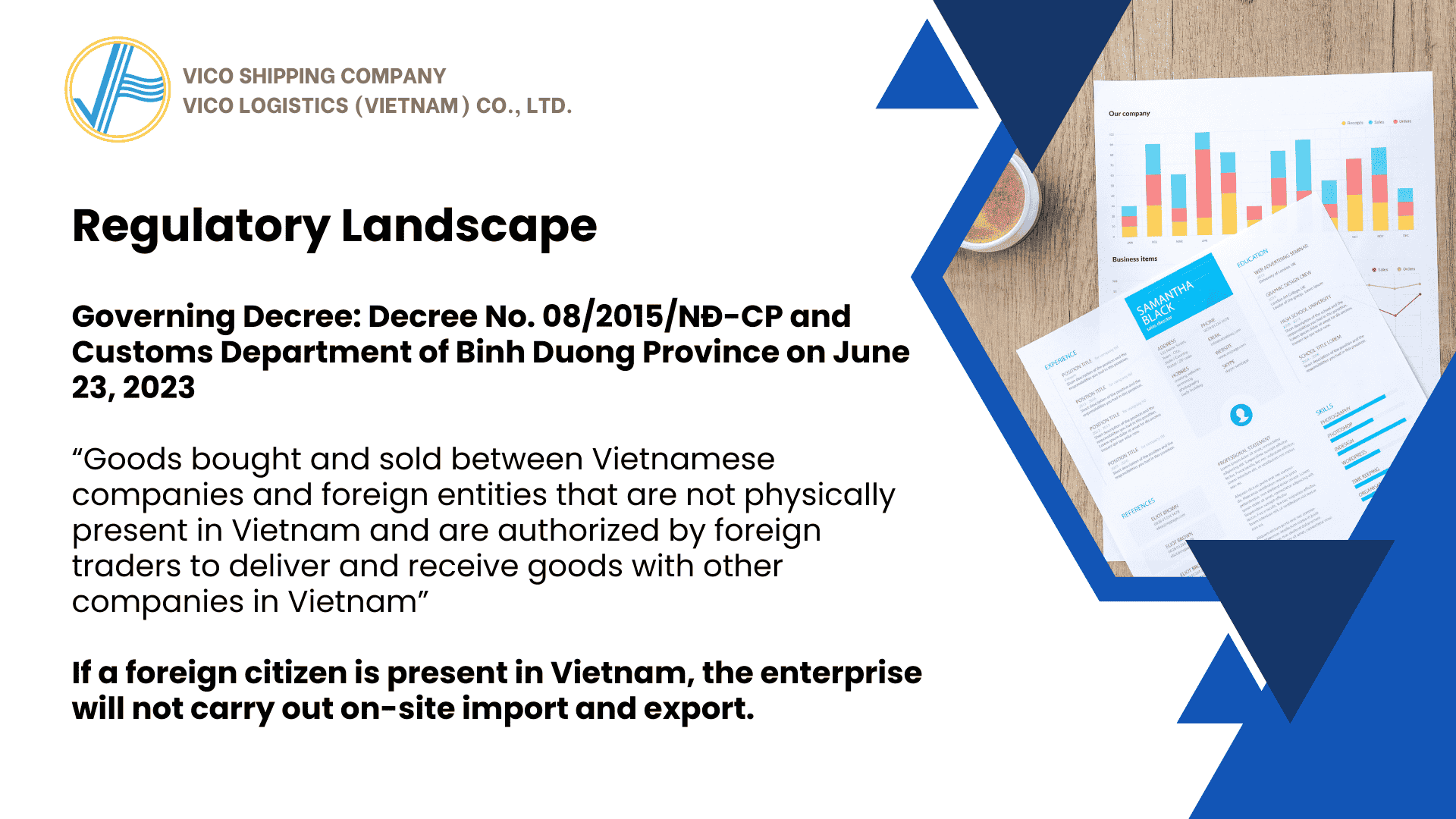
2. Detailed Breakdown of Changes in On-Spot Import-Export Procedures
The most significant change outlined in the draft is the repeal of Article 35. This has implications for companies engaged in various forms of on-spot transactions. These transactions involve goods traded between a Vietnamese business and a foreign entity without the goods leaving Vietnam.
Specifically, for companies relying on on-spot import-export transactions (as governed by Point C, Clause 1, Article 35), the new regulation proposes that this model be allowed for only one year under the amended decree. However, this only applies if businesses meet specific conditions laid out by the new decree.
Foreign Entities and On-Spot Transactions:
For foreign entities without a presence in Vietnam, the on-spot transaction rules have been clear. Such entities can engage in import-export activities under Decree 08 as long as they don't have a physical presence (e.g., an office or branch) in Vietnam. This allows Vietnamese businesses to trade with foreign firms while keeping goods within the country.
3. Solutions for Businesses: Adapting to the New Reality
Given the upcoming regulatory changes, businesses need to act swiftly and strategically. Here's how your company can stay compliant:
Bonded Warehouse Solutions
As the upcoming regulations aim to eliminate certain on-spot import-export activities, bonded warehouses have become an increasingly attractive solution.
A bonded warehouse meets the definition of a non-tax area as stipulated in Clause 1, Article 4 of the Law on Export and Import Taxes No. 107/2016/QH13 and is also a separate customs area as prescribed in Clause 4, Article 3 of the Law on Foreign Trade Management No. 05/2017/QH14.
Bonded warehouses in Vietnam are designated as non-tax areas and separate customs zones. Goods can be stored in these customs-controlled areas without being immediately subject to import duties, providing flexibility for on-spot transactions. Consequently, businesses importing goods from a bonded warehouse for export production can qualify for import tax and VAT exemptions under specific conditions outlined in Vietnamese law.
Compliance with Circular 39
For companies still eligible for on-spot import-export under Circular 39, it’s crucial to fully understand and comply with these provisions. This includes ensuring that all customs documentation is properly filled out and submitted in a timely manner.
VICO Logistics' On-Spot Trading Solutions via Bonded Warehouses
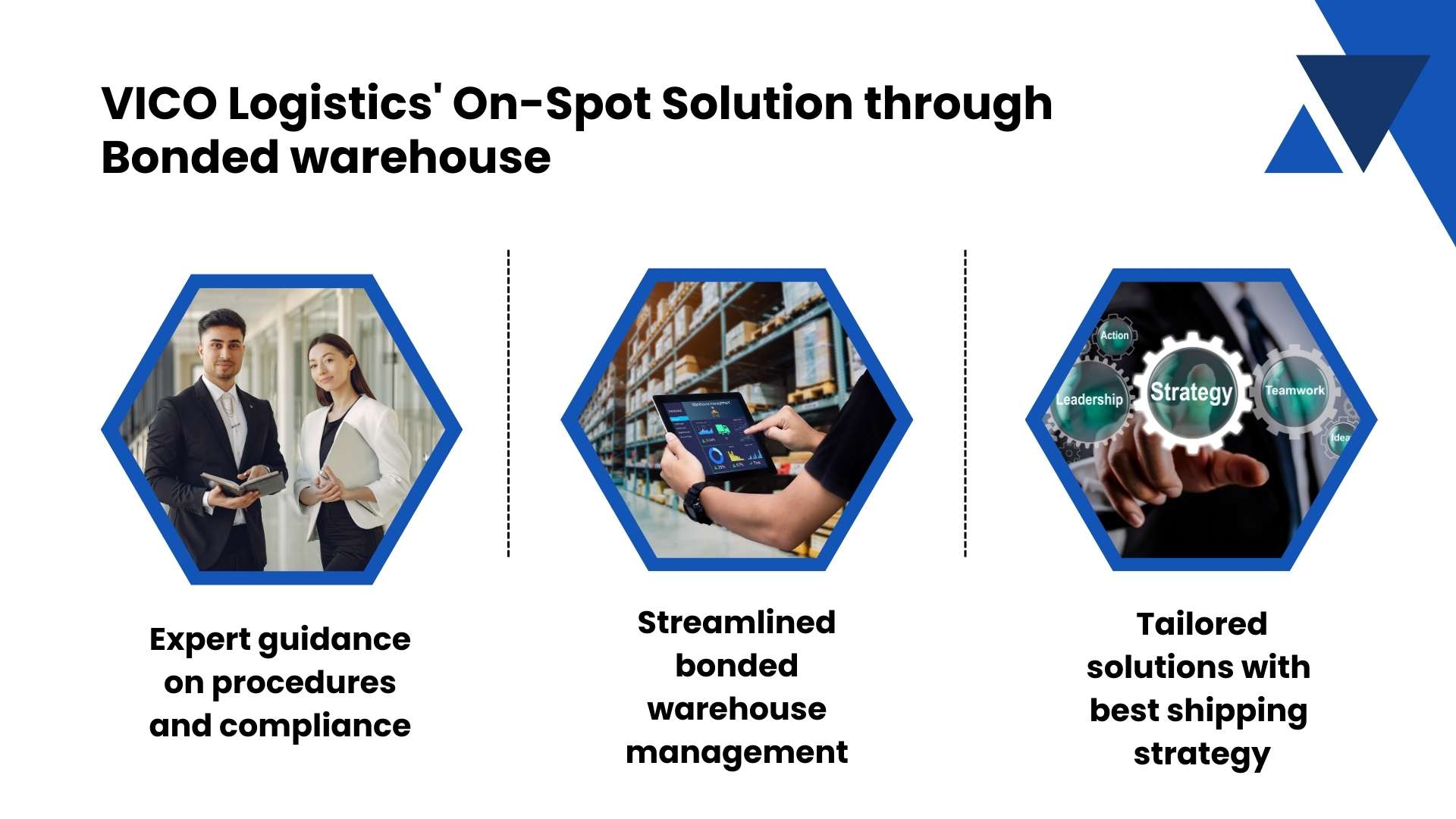
To help businesses overcome these challenges, VICO Logistics provides comprehensive on-spot import-export solutions through bonded warehouses. Our services include:
Transportation: VICO Logistics ensures efficient transportation of goods from the manufacturer to the bonded warehouse, and from the warehouse to the final delivery location. This service minimizes delays and ensures timely delivery of goods.
Warehousing: Goods are securely stored in VICO Logistics' bonded warehouses, where they remain under customs supervision. This allows for the deferral of duties and taxes until the goods are moved to their final destination, optimizing cash flow for businesses.
Customs Procedures: VICO Logistics handles all import, export, and warehousing customs procedures on behalf of the business. By managing the complexities of customs documentation and compliance, we reduce the burden on your team, ensuring faster clearance and compliance with the latest regulations.
Final Delivery: Once all customs procedures are complete, VICO Logistics arranges for the delivery of goods to their final destination, whether it’s a manufacturing facility or a retail store. Our streamlined logistics process helps businesses maintain smooth operations and avoid unnecessary delays.
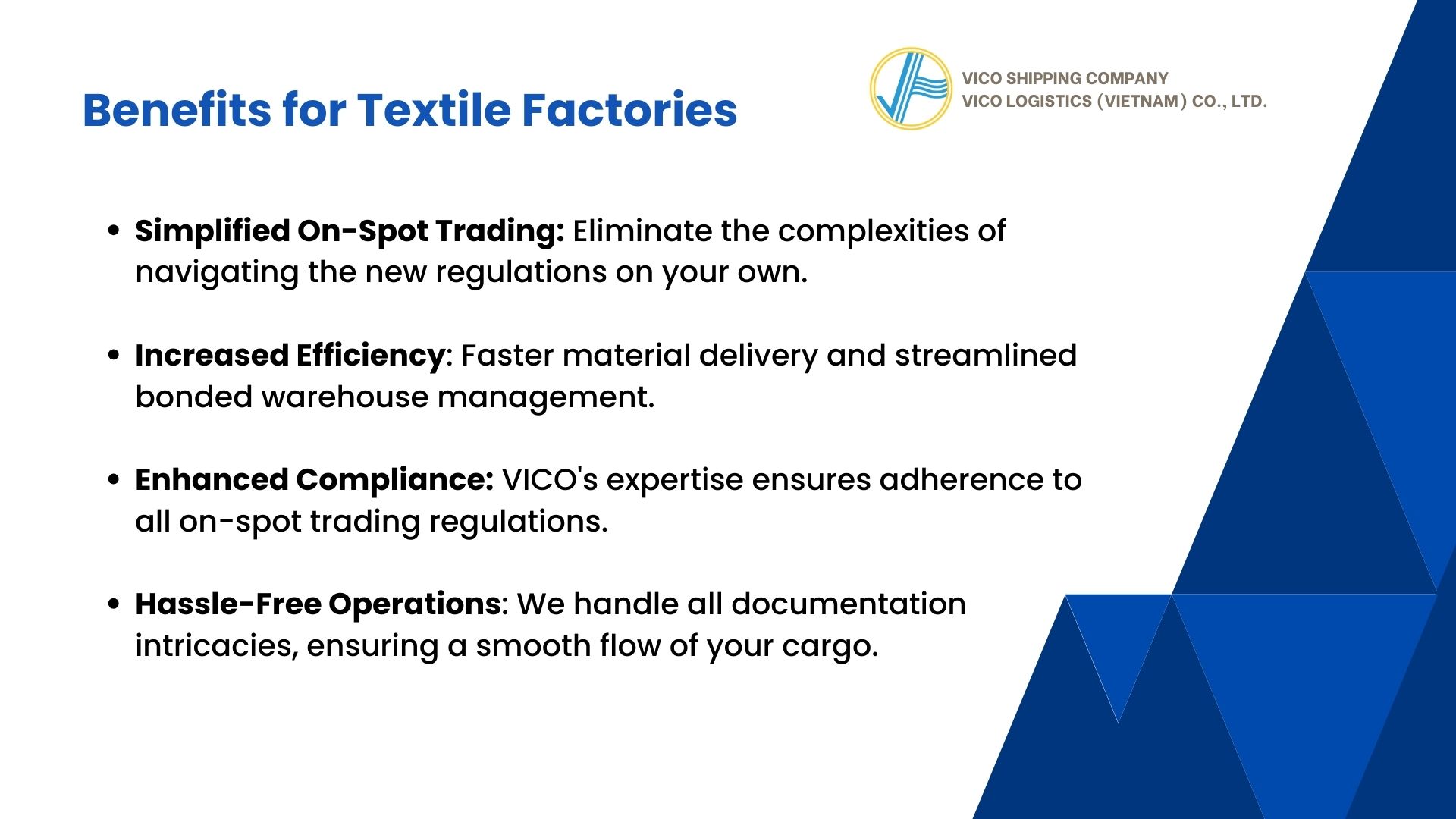
4. If a company outsources part of its production for processing, can it still claim a tax refund?
In principle, VAT refunds are still possible for outsourced production. Companies must ensure they issue VAT invoices at 10% for inputs. Upon exporting the finished goods abroad or to free trade zones, VAT refunds can be claimed.
However, recently, tax authorities have required additional documentation on transport details, such as license plate numbers and delivery points. Moving forward, this data will need to be included on invoices to qualify for VAT refunds.
5. VICO Logistics’ Recommendations for Clients
At VICO Logistics, we recommend the following steps for companies navigating these regulatory changes:
- Stay Updated on Policy Changes: Customs and tax regulations change frequently. It’s essential to remain informed of all new policies, especially regarding on-spot import-export procedures. VICO Logistics will continue to provide timely updates as new regulations are implemented.
- Double check with customs authorities and tax department: while local customs authorities may approve the use of bonded warehouses, businesses are required to double-check with local tax departments before proceeding.
- Evaluate the Use of Bonded Warehouses: If your business frequently engages in on-spot transactions, consider switching to bonded warehouse procedures to remain compliant with the new regulations.
- Review Your Contracts with Foreign Partners: The repeal of Article 35 means that businesses trading with foreign partners without physical presence in Vietnam may need to restructure their contracts. Consulting with VICO Logistics can ensure that your operations remain smooth during the transition.
6. Proposed Steps to Enhance Business Efficiency and Minimize Customs Risks:
Upgrade internal management systems and standard operating procedures (SOPs) to ensure accuracy, efficiency, and consistency in data recording.
Consult with experts for specific guidance and real-life cases related to emerging trends in customs audits and inspections.
Conduct an annual comprehensive review of customs compliance to evaluate the company’s standing and better prepare for upcoming customs inspections.
Stay informed on the latest customs audit trends and ensure all relevant documents are prepared. Estimate future customs inspections on a 5-year basis (for regular companies) or 3-year basis (for priority companies), depending on the company’s actual compliance situation.
Staying Ahead with VICO Logistics
With years of experience in customs compliance and international logistics, VICO Logistics is here to support your business through these changes. We understand the complexities of on-spot import-export activities and can provide expert guidance on how to remain compliant while optimizing your logistics operations.
Conclusion: Prepare for the Future of On-Spot Import-Export
The regulatory landscape for on-spot import-export in Vietnam is undergoing significant changes. With the Draft Decree amending Decree 08/2015/NĐ-CP, businesses will need to rethink their current models, especially those relying on trading with foreign partners without a presence in Vietnam. The repeal of Article 35 presents both challenges and opportunities, and businesses must act quickly to adapt to these new regulations.
To navigate these changes, companies can benefit from utilizing bonded warehouses, ensuring more streamlined customs processing and reducing potential delays or disruptions in their supply chain.
At VICO Logistics, we are committed to keeping our clients ahead of the curve by providing expert advice and strategic solutions to navigate these regulatory changes.
---
VICO Logistics – Textile Logistics Provider
Premium member of Eurocham, JCtrans, VLA, VCCI, VITAS... associations
Owned offices: Hong Kong (headquarters), China (Shenzhen, Shanghai), Vietnam (Ho Chi Minh, Da Nang, Hai Phong).
Follow us for more valuable information
Book now: https://vico.com.hk/#quotation
Contact us: mkt4_hcm@vico.com.hk (For business development)
